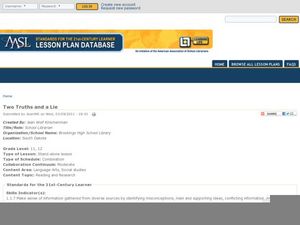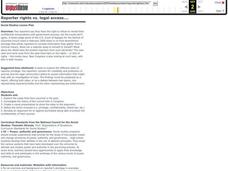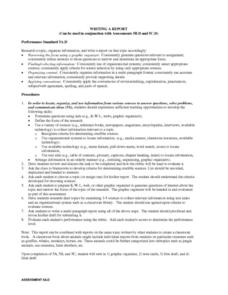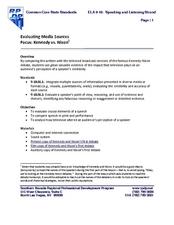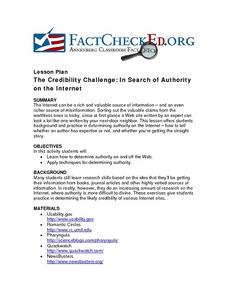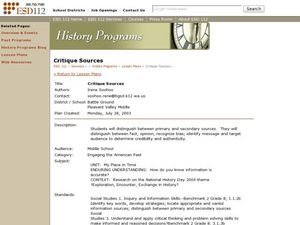Curated OER
Taming the Wild Wiki
Take a look at the credibility of online sources such as Wikipedia. Discussion points and handouts are included to facilitate a meaningful and informative dialogue. Tips are given on how to determine if a Wikipedia article is reliable...
EngageNY
Grade 9 ELA Module 3, Unit 2, Lesson 4
It seems like the first result in a search engine is the best source, but how can you be sure? An activity on assessing sources guides ninth graders through an integral part of their inquiry-based research project, based on questions...
EngageNY
Using Search Terms for Further Research: Industrial Organic Food Chain
Class members conduct independent research to continue examining the consequences of the industrial organic food chain from Michael Pollan's The Omnivore's Dilemma. Pupils learn about source credibility and effective search terms, then...
Newseum
Can I Trust the Creators?
It's easy to find information at the click of a mouse, but is it trustworthy? Pupils learn about the E.S.C.A.P.E. acronym for evaluating sources. Next, learners read a news story and evaluate its sources to determine credibility. Last,...
EngageNY
Researching Digital Sources, Part 1: Guided WebQuest
We are living in a technical world. Scholars learn how to examine digital resources for their research on DDT. They explore a list of websites using a Digital Resources on DDT sheet. Learners examine their research notebook to determine...
EngageNY
Deepening Your Research
Give credit where credit is deserved. Scholars discuss what makes a credible source as they take a look at "An Apparel Factory Defies Sweatshop Label, but Can It Thrive?" Learners read the article to look for answers to the research...
Curated OER
How to Locate and Evaluate Information, Part I - Online Catalog
Using the online catalog, researchers locate and record on a citation template specific sources for their research paper. A library specialist models searching strategies while the teacher introduces the research paper process. Daily...
Curated OER
Two Truths and a Lie: Internet Research Skills
It's tough for high schoolers to assess what is a credible resource and what is not. A helpful resource prompts class members to research a particular topic and record two facts—and create one lie—while documenting the sources. They then...
Nemours KidsHealth
Media Literacy and Health: Grades 6-8
Internet suffers could drown in the volume of information available on line. Here's an activity that can be a lifeline and buoy confidence in middle schoolers' ability to find reliable information and credible sources. After reading...
Curated OER
Alphabet Soup Job Descriptions
Eleventh graders investigate New Deal programs. In this Great Depression lesson, 11th graders read the provided source materials that detail the agendas of 3 New Deal agencies. Students complete the provided analysis sheets and then...
Curated OER
The Three Bad Little Pigs
High schoolers examine and interpret conflicting primary sources.
National Endowment for the Humanities
Revolution '67, Lesson 2: What Happened in July 1967? How Do We Know?
Even in a world in which dozens of participants and curious onlookers record every controversial event, the basic facts of what happened are often in dispute. Revolution '67, Lesson 2 explores 1967 Newark, New Jersey using an examination...
Newseum
Putting the Consumer's Questions to Work
Who, what, when, where, why, and how are good questions to ask when evaluating a source. First, scholars find two sources of information relating to a chosen topic. Next, pupils complete a worksheet to gauge the source's credibility....
PBS
Broadcast News
Just because a story is on the news doesn't mean it's being presented fairly. Analyze news broadcasts with a instructional activity focused on evaluating television journalism. At home, kids watch a news show and note the stories...
Curated OER
Reporter Rights vs. Legal Access...
Students explore cases that have occurred in the past in which reporters refuse to reveal their confidential conversations with government sources and investigate the status of the current bills in Congress. Students use this information...
National History Day
“War Is Hell. We Know it Now.” American Soldiers in the Meuse-Argonne Offensive
Understanding the soldier's experiences during World War I sometimes takes a newscast. Learners see the importance of understanding multiple points of view with a newscast project surrounding the Meuse-Argonne Offensive. Compare and...
Curated OER
Writing a Report
Young scholars conduct research on a selected topic, organize the research information, and write a report. They read and discuss the rubric, brainstorm to develop criteria for determining credible sources, complete a KWL chart or web,...
Curated OER
Evaluating Sources
Students conduct research and evaluate the sources they find. They identify various sources from their research. They employ technology resources to improve problem solving and decision making skills.
Curated OER
Suspect Sources at the Republican Debate
Students explore and analyze statements made during a televised presidential debate. In groups, they research and test the validity of the statements made by the presidential contenders. Students examine sources and draw conclusions on...
Southern Nevada Regional Professional Development Program
Evaluating Media Sources
Just how much influence did television have on the results of the 1960 presidential election? Media critics contend that the results were all about how the two candidates appeared on the screen. Give your young historians a chance to...
Curated OER
The Credibility Challenge: In Search of Authority on the Internet
Students identify and interpret the background and practice in determining authority on the Internet. Then they identify how to tell whether an author has expertise or not, and whether they're getting the straight story. Students also...
Curated OER
Gathering and Evaluating Sources for the "Greatest American" Speech
Students brainstorm a list of criteria for determining credible sources for their research. They research information to include in their "Greatest American" speech. Students will evaluate all sources by applying the criteria they agreed...
Curated OER
Critique Sources
Students distinguish between primary and secondary sources. They study about fact, opinion, and recognize bias. Students find out if information is accurate or not and report on it. For the final project students create an annotated...
California Academy of Science
Nuclear Energy: What's Your Reaction?
OSHA confirms that rules governing worker safety at nuclear power plants ranks higher than worker safety in offices. Scholars must consider safety, cost, alternatives, and other factors before recommending whether a town should build a...
Other popular searches
- Source Credibility
- Internet Source Credibility
- Article Source Credibility
- Evaluating Source Credibility









